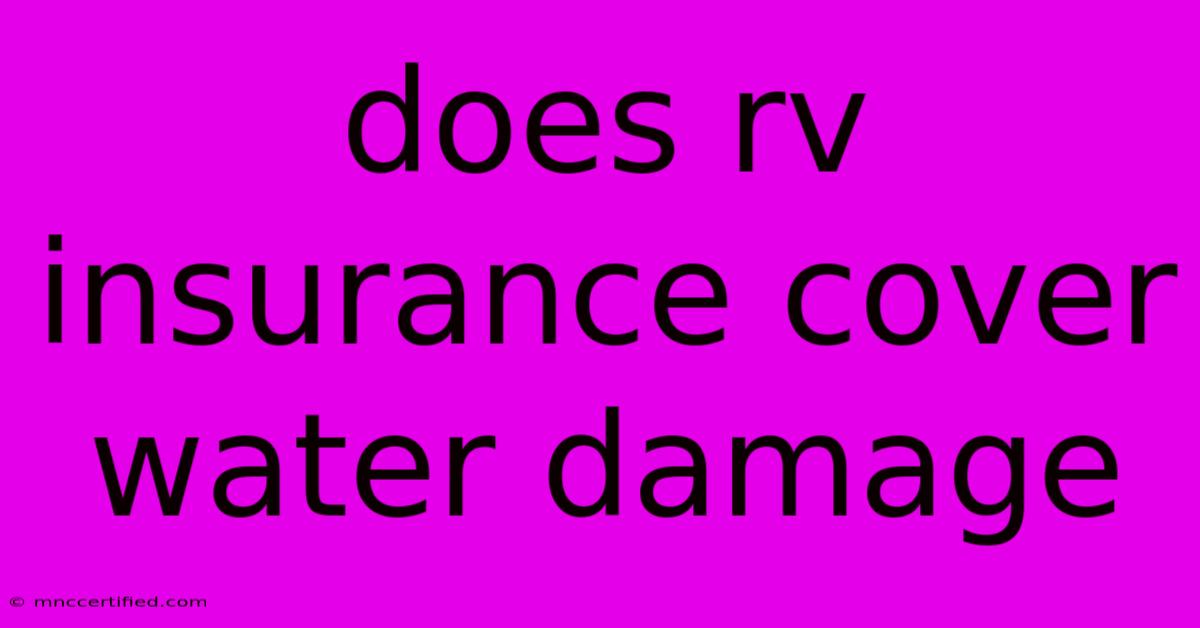Does Rv Insurance Cover Water Damage

Table of Contents
Does RV Insurance Cover Water Damage? Understanding Your Coverage
Owning an RV is a dream for many, offering freedom and adventure on the open road. However, like any vehicle, RVs are susceptible to damage, and water damage is a common concern. So, the question arises: does RV insurance cover water damage? The answer, unfortunately, isn't a simple yes or no.
Understanding the Basics of RV Insurance
RV insurance policies, similar to car insurance, offer various types of coverage. These include:
- Liability Coverage: Protects you financially if you're at fault in an accident causing damage to another person's property or injuries.
- Collision Coverage: Covers damage to your RV if you're involved in a collision with another vehicle or object.
- Comprehensive Coverage: Offers protection against damage caused by events other than collisions, including theft, vandalism, and natural disasters.
Water Damage and RV Insurance
Water damage is often covered under the comprehensive coverage portion of your RV insurance policy. However, there are several important factors to consider:
1. The Source of the Water Damage:
- Flooding: If your RV is damaged by a flood, your insurance will likely cover the loss, depending on your policy and whether the flood is considered a "covered peril."
- Leaks: Leaks from plumbing systems, roofs, or windows are also generally covered.
- Rain Damage: If rainwater enters your RV through open windows or doors, it might be covered, but some policies have limitations for rain damage.
- Sewage Backups: This is a common issue in RVs and may be covered, but some policies may exclude it or require specific endorsements.
2. Policy Exclusions:
It's important to understand your policy's exclusions. Common exclusions for water damage include:
- Neglect: If you fail to maintain your RV's systems and neglect leads to water damage, your insurance might not cover it.
- Pre-existing Conditions: Water damage that existed before you purchased the insurance policy is unlikely to be covered.
- Wear and Tear: Routine wear and tear, such as minor leaks, is generally not covered by insurance.
3. Importance of Understanding Your Policy:
Read your policy carefully! Your specific RV insurance policy details the extent of your coverage for water damage. It may have specific limits, deductibles, and exclusions that apply.
Steps to Protect Your RV from Water Damage:
- Regular Maintenance: Keep your RV's plumbing systems, roof, and windows in good condition to prevent leaks.
- Inspection Before Trips: Before embarking on any journey, inspect your RV for potential leaks.
- Use Water-Resistant Materials: Consider using water-resistant fabrics and upholstery to minimize water damage in case of spills or leaks.
- Secure Windows and Doors: Ensure your RV's windows and doors are properly sealed during storms or when parked.
Conclusion:
While RV insurance can offer coverage for water damage, it's crucial to carefully review your policy and understand its limitations. By taking preventive measures and staying informed, you can minimize the risk of water damage and ensure you're adequately protected. Remember, consulting with your insurance agent can clarify your specific coverage and provide peace of mind on the road.

Thank you for visiting our website wich cover about Does Rv Insurance Cover Water Damage. We hope the information provided has been useful to you. Feel free to contact us if you have any questions or need further assistance. See you next time and dont miss to bookmark.
Featured Posts
-
How To Watch Ny Giants Vs Panthers Nfl Munich
Nov 11, 2024
-
How To Get A Bonded Title In Florida
Nov 11, 2024
-
Watch Real Sociedad Vs Barcelona Live La Liga
Nov 11, 2024
-
Chelsea Vs Arsenal Free Stream And Tv Info 11 10 24
Nov 11, 2024
-
Abd Insurance And Financial Services
Nov 11, 2024